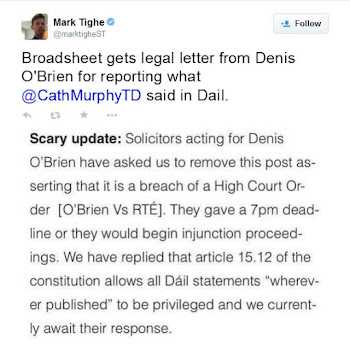Friday, May 29, 2015
What Constitution?
I see it all as very straightforward.
RTÉ wanted to publish some details of an arrangement Denis O'Brien had with IBRC (formerly Anglo Irish Bank). Neither O'Brien nor IBRC wanted the information published, on the grounds that it would damage his/their commercial interests, and they got a court injunction prohibiting RTÉ from publishing it.
Clear so far.
Catherine Murphy, TD, subsequently stated in the Dáil (Irish lower house of Parliament) that O'Brien had been getting significant loans at below market rates and, as IBRC was owned by the State, that this amounted to a massive taxpayer subsidy.
O'Brien's lawyer immediately requested most of the media not to publish Murphy's remarks as either the information was already injuncted or he would obtain an injunction to prohibit publication (I haven't seen the letter so I don't know its precise wording).
Most of the media reacted by pulling any copy which contained the controversial information. For example, the Irish Times had already published it online but quickly pulled the item and a sanitised version was not issued until some seven hours later. This is the paper that not so long ago consciously broke the law to protect its sources.
Broadsheet.ie, on the other hand, stood its ground. It also revealed that it had received a legal letter from the O'Brien camp.
And Peter Murtagh, of the Irish Times, did the clever thing late last night and tweeted a link to the Dáil transcript on the Oireachtas website.
Personally, I think the issue is still very clear. Words spoken in the Dáil are guaranteed absolute privilege under the Constitution as is their reporting. Therefore no lawyer or judge can stop the media reporting Murphy's words in parliament. And that includes RTÉ.
The injunction, whatever its merits otherwise, is not relevant to the reporting of Parliament and the constitutional guarantee trumps any court decision. The only relevance of the existing injunction in this case was whether Murphy would give any weight to it in deciding whether or not to say her piece in Parliament. Once it was said it was protected.
So I'm still very clear on the matter (though admittedly I am not an authority in this area).
What disturbs me is how the bulk of the media immediately ran for cover when they got the legal letter. These are the organs on which we depend to defend our right to information and our freedom of speech. If they can be upset that easily they are clearly not up to the job.
Some politicians have called for the Dáil to be recalled to debate the matter, but it seems to me that it is not a matter for Parliament at this stage. It is a matter for those media who have buckled under a piece of legal blustering and fallen down on their duty to report faithfully what goes on in Parliament. Such reporting has a specific constitutional guarantee, for God's sake.
It is up to Parliament itself to deal with the issue of whether if feels Murphy's statement constituted an abuse of privilege or not.
I would be very interested to see the justification, if any, for the issue of the legal letter and to see its precise wording. I would also like to see whatever legal advice the media got which led them to pull their copy. There is something not very right going on here and it needs the light of day shone on it fast.
Brian Lucey has an interesting nuance in his latest blog post. The implication is that if this were to become a regular occurrence and people's reputations were being destroyed by false accusations rather than by revelations in the public interest, something would have to be done about it. Possibly, but that's for another day.
Labels:
Constitution,
Dáil Éireann,
Denis O'Brien,
injunction,
media
Subscribe to:
Post Comments (Atom)




By way of illustration, just imagine for a moment that the statement had been made in the Dáil and the ineffable one immediately applied to a court to have its reporting injuncted.
ReplyDeleteHe'd be thrown out on his ear. Were he not, the judge should be sacked or impeached or whatever is capable of being done to idiot judges.
The extract below from the Defamation Act 2009 would seem to confer absolute privilege in this case.
ReplyDeleteSection 17 – Absolute Privilege
... it shall be a defence to a defamation action for the defendant to prove that the statement in respect of which the action was brought was— (a) made in either House of the Oireachtas by a member of either House of the Oireachtas ...
Imagine, if you will, the Minister for Justice, Equality and Law Reform stating in the Dáil that a certain investigative journalist "posed a threat to Irish security". Imagine that a journalist friend of the Minister's published that in a newspaper of the Independent group. Imagine that the investigative journalist lost his job as a result of that accusation. Imagine that the investigative journalist denied all accusations, and the Minister declined to repeat them outside the chamber. Imagine, then, Michael McDowell and Frank Connolly ten short years ago.
ReplyDelete